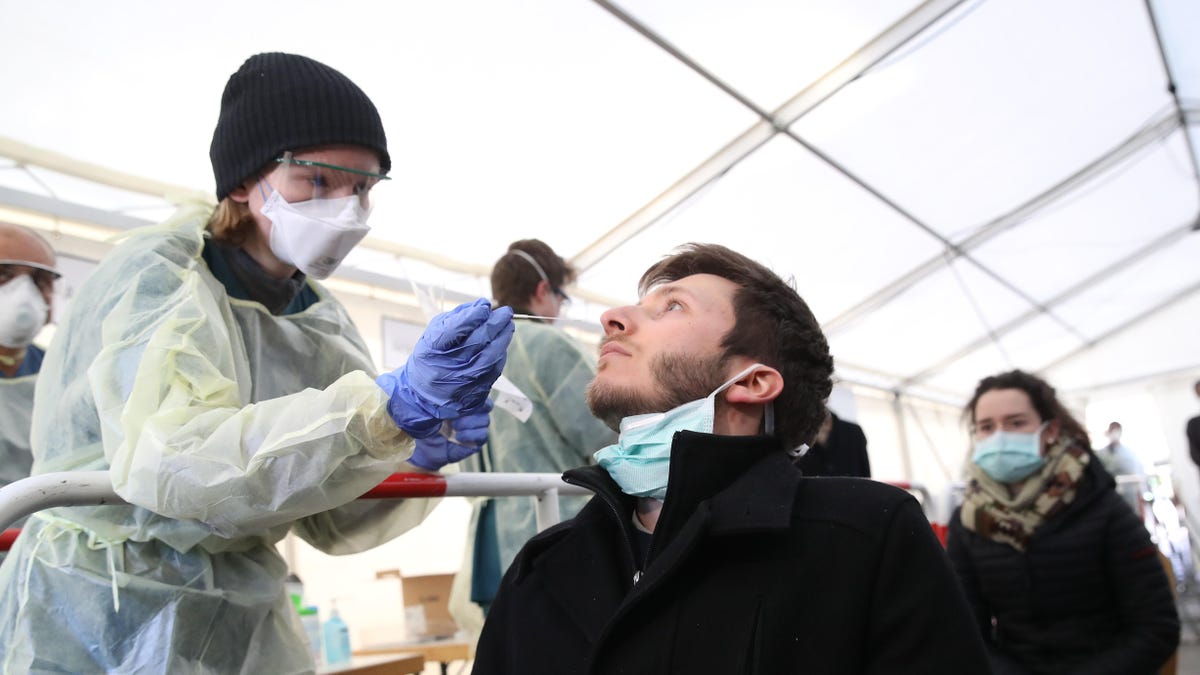Coronavirus study finds 'surprising' link between infection and loss of smell
Harvard scientists suggest COVID-19 might cause loss of smell by damaging a particular set of cells in the nose.

Testing for coronavirus in Germany, medical personnel take samples from the nose.
While the coronavirus pandemic has rapidly spread across the world, keeping most of us squirreled away inside our homes, scientists have been tirelessly working at unravelling how the virus infects us and the possible damage it causes. In recent weeks, new evidence has emerged that patients with COVID-19 infections may lose their sense of smell, a condition known as "anosmia."
Previous coronaviruses have been known to cause a loss of smell, according to the British Rhinological Society. Reports from some of the hardest hit nations suggests this new coronavirus -- dubbed SARS-CoV-2 -- has knocked out patients ability to detect scents. The condition seems to be so widespread that some medical associations suggest it should be added to the symptoms for screening COVID-19 infections.
In a new study, yet to be peer-reviewed and submitted to the bioRxiv repository on March 28, a group of Harvard scientists explored the relationship between the virus and loss of smell by examining genes in the olfactory system -- the nose and pathways that relay "smell" information to your brain.
"There seems to be a strong association between the development of disturbances in smell and getting COVID-19," said Sandeep R. Datta, a neurobiologist and lead author of the pre-print publication, in a statement to the Harvard Crimson. "It seems like this may be one of the hallmarks of the disease."
Scientists have shown SARS-CoV-2 infects cells through the use of its "spike" protein, which enables the virus to lock onto the surface of a human cell via a receptor known as ACE2. The spike protein clicks into place like a USB in a USB slot and allows the coronavirus to hijack the cell. The brazen heist sees SARS-CoV-2 make more copies of itself, but it can also do damage to the cell.
Datta and his team suspected that nerve cells responsible for smell may be damaged by the virus and so went looking through datasets to see if the cells contained ACE2 and one other protein that helps SARS-CoV-2 get inside cells. This is where the surprise came.
The datasets suggest its not nerve cells that SARS-CoV-2 enters, but a different subset of "epithelial" cells -- the cells on the surfaces inside your nose. A particular subset of cells -- sustentacular cells -- may also be negatively affected, which could manifest as a loss of smell.
Whether or not COVID-19 can cause a permanent loss of smell is still to be determined. Writing in the Conversation, Carl Philpott, a rhinologist at the University of East Anglia, suggests its too early to tell what the long-term damage may be. The work by Datta and colleagues suggests the effects may be long-lasting -- because SARS-CoV-2 can also infect the stem cells, those cells which eventually mature into functional cells in the nose.
The study's authors conclude further experiments will be required to definitively show how our sense of smell is affected by COVID-19, but it appears more clear-cut that we should be wary of anosmia as a symptom of infection.

